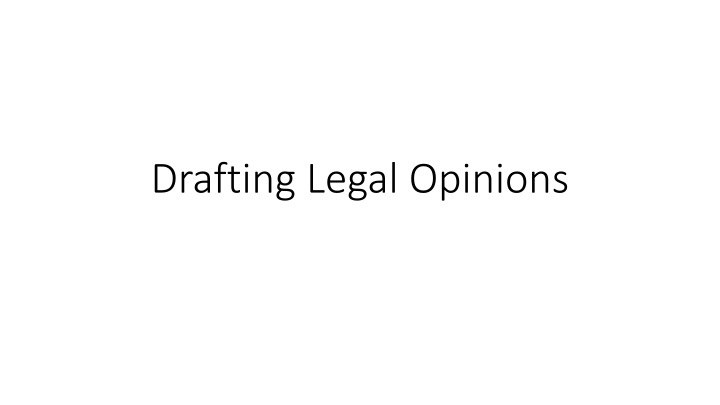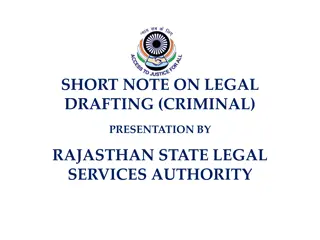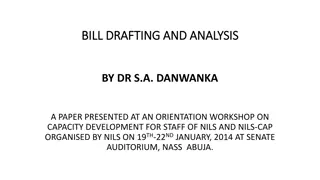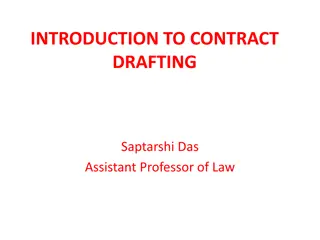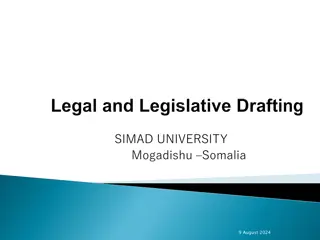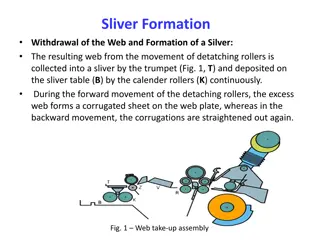Essential Guide to Drafting Legal Opinions
Understand the purpose, format, process, and factors to consider when drafting legal opinions. Learn why clear communication is crucial, the importance of representing the view of the firm, and the distinction between opinions in emails versus letters.
Download Presentation

Please find below an Image/Link to download the presentation.
The content on the website is provided AS IS for your information and personal use only. It may not be sold, licensed, or shared on other websites without obtaining consent from the author.If you encounter any issues during the download, it is possible that the publisher has removed the file from their server.
You are allowed to download the files provided on this website for personal or commercial use, subject to the condition that they are used lawfully. All files are the property of their respective owners.
The content on the website is provided AS IS for your information and personal use only. It may not be sold, licensed, or shared on other websites without obtaining consent from the author.
E N D
Presentation Transcript
Purpose of a legal opinion The primary purpose of a legal opinion is communication of advice to either a lay or professional client. It is therefore of the utmost importance that it is clear and in plain, understandable English. Every word of the legal opinion should be chosen by the writer because it communicates precisely the advice which the writer intends to covey. A legal opinion provides options Always remember a legal opinion is giving advice
Format F Facts I Issues Legal Factual R Rule of Law A - Analysis C - Conclusion
Factors to Consider Nature of issues Why a legal opinion is needed Audience/client Format letter or brief Language to be used technicalities/plain English
Process Legal opinions should represent the view of the firm/institution Reputation and professional standing is at risk Need to internal procedures for opinions Have review mechanisms
What is a legal opinion? A legal opinion is traditionally in letter form but may be in form of a brief with a forwarding letter Any writing can contain a legal opinion. For example, written memoranda often contain legal opinions An email can be a legal opinion
Email v Letter Conclusions of law stated in an e-mail may rise to the level of an opinion, but may not be rendered with the care and procedures that should be applied to an opinion. The informality of drafting and sending an e-mail may lead the sender to make statements that would not be made in letter form. Take greater care in determining the content of an e-mail, particularly if it contains a legal opinion, because of the ease and informality with which e-mail is circulated.
Facts Legal opinions involve conclusions of law as applied to facts that are either known to or assumed by the law firm. Legal opinions usually should not contain representations of fact by the law firm. Opinions should not be given if they are outside the expertise of the law firm. Attention should also be given to adequate due diligence and documentation in the file to support the representation of fact.
Signing Legal Opinions Individual? Law firm?
Unwritten Legal Opinions A legal opinion can also be delivered verbally. Care should be taken in verbally expressing legal opinions. It is often difficult to document later the precise nature of a verbal opinion, because memories will differ and fade, and notes may be inaccurate. When a particularly sensitive matter is being discussed, it may be appropriate for an Advocate to confirm the advice in written form, to minimize disagreements regarding the nature of the advice.
Unwritten Legal Opinions When discussing a matter with a client, it may be appropriate to verbally advise the client whether, and to what extent, you are giving a legal opinion.
In-House Legal Opinions These are basically internal memos But consider whether the audience is a third-party
